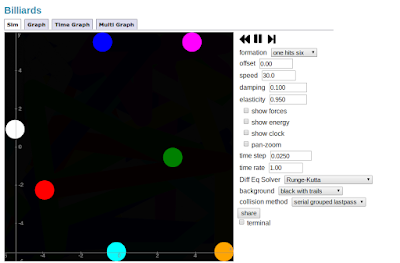What I found was an excellent site created by probably one of the smartest people in our generation, who hasn't merely jumped on the computer or data bandwagon, but was one of the early birds to that whole dominating phenomenon (or reality, since they're running the world at this point).
The site is called My Physics Lab, and I assume anyone who studies that discipline knows it, because the computer student already knew about it when I told him that I found a decent explanation of differential equation there.
The creator of the site is Erik Neumann, who "was fortunate to get involved in the Macintosh software industry early on." He then describes an impressive resume of working in all kinds of computer stuff (my purposely non-technical word). Then, he "relearned calculus by doing all the problems in [his] old college text book and took further math classes at the University of Washington." He created the "website as a way to practice what [he] was learning," and he continues "to work on physics simulations, with several new ones in development."
HUH? I'm still trying to figure out how to do basic things, like caulking a bathtub or avoiding bread. Meanwhile, Erik is creating *physics simulations* for the fun of it. Actually, you should check them out on the homepage...when you click on them they move/animate (for people like me, who just like sparkles and baubles). Or if you want the "explanations," you can look at the scientific/technical information. There's so much to describe, I took some screenshots because it's so incredible that this guy has done all this, in addition to his super-cerebral career/work, in addition to whatever else is going on in his life.
 |
| Billiards animation screenshot |
 |
| Billiards explanation and other nerdy info |
Anyway, way to go, Erik, and remember us commoners on the prairie out here.